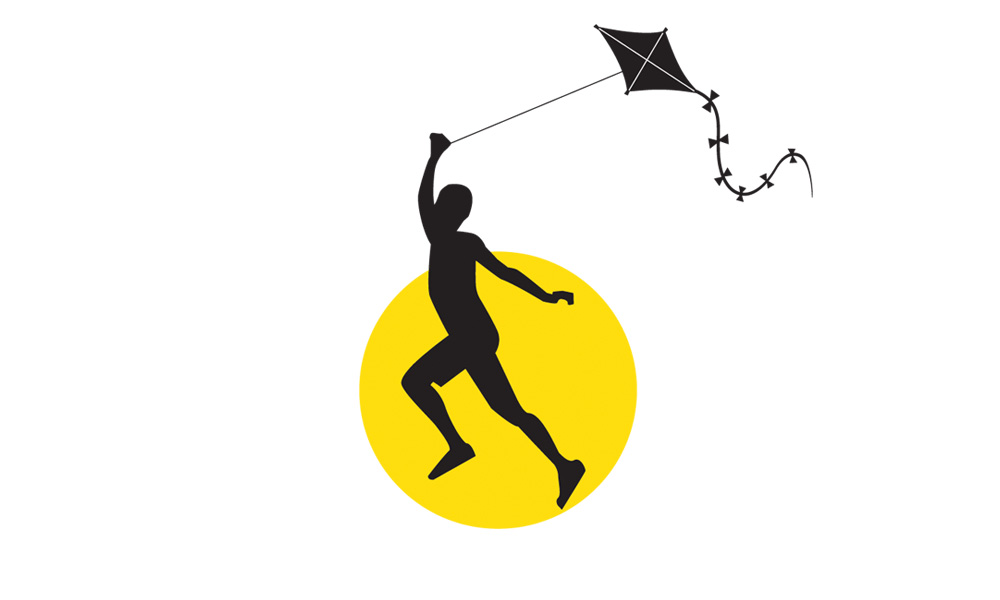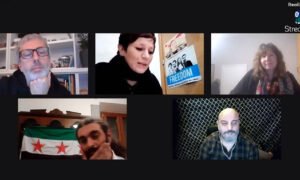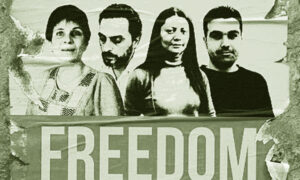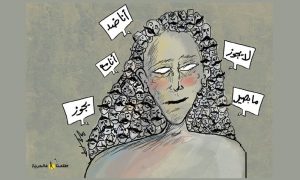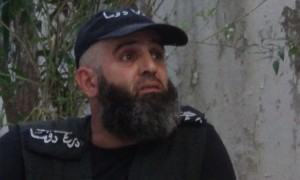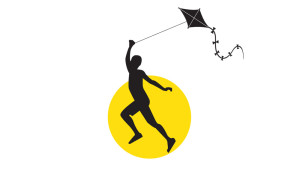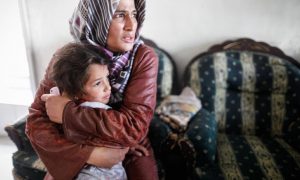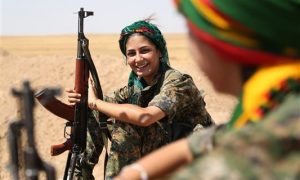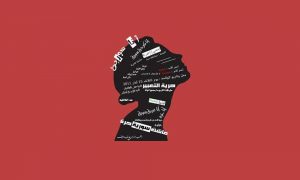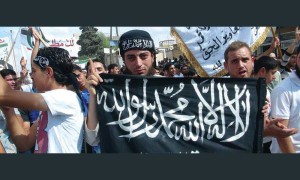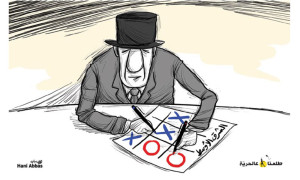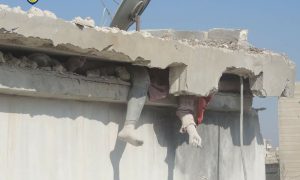Rising for freedom- published in 30 September , 2015
Sameeh Safadi
There are some cultural and moral distinctions between the various popular segments of the Syrian society, that led to distinctions in their political positions, and affected to a large extent their loyalty to the regime, the revolution, or their passive neutrality, and this is based on characteristic attributes related to the ethical reference and the disparate raising patterns that they were brought up by, which in my opinion, are patterns beyond denominations, though particular patterns prevail in particular groups that will pointed at later.
We wouldn’t be exaggerating if we said that the spirit of the Syrian revolution that began in 2011, and was represented by its first heroes, was a Don Quixote spirit saturated with courage, altruism, and good conscious, and it could have actually established a new reality and a new consciousness’ culture, if it were meant to live, but just like Don Quixote “the icon of the hourly nobility in the good of humanity, and who always hit the grim reality and ends up failing”, so was the Syrian revolution which “its means failed to achieve its aspirations”. The cruelty and excessive violence with which it was confronted, overthrew these dreams and promises, and literally killed its human bearer; first and second row leaders, till the tenth later on… the Syrian reality actually appeared to be open to a deep abyss of violence, hatred, and fire, in which the last mind, conscience, and dream remaining, were crushed on its alter.
As much as the Syrian revolution revealed heroics and moral exploits that are rarely seen in humanity, it , on the other hand, revealed lack of morality and an overwhelming absence of the human conscience, and here I am talking about the contradictions of the Syrian society itself, and I’m not concerned with the external position of other countries or peoples.
The horrifying scene of a child being slaughtered, an elderly being humiliated and tortured, a detainee, starved and tortured to death, or a scene of houses being destroyed over the heads of its inhabitants and crushing their bones, are committed first and foremost by Syrian hands, and when displayed on the screens, it attracts five different moral positions of Syrian people ( I here put five lines under the word <<different>>), how could this be understood? Is it possible to comprehend this difference mentally? Or do we need to use psychoanalysis vocabularies in order to understand these horrific contradictions and this strange self-cheating to the most obvious and most <<prioritized>> matters: killing, blatant assault on people’s lives, and on the social existence of the human being.
The missing superego:
The late scholar Hisham Sharabi, observed an unexpected case that indicates the weakness of <<the super ego>> in the Arabic psychological structure, which is raised on repression. The Arabic child, in his belief “feels more ashamed than he feels guilty, the motive behind his shame is that others observed his bad action, and not because he regrets doing this bad action, judging himself as it should be judged”.
Sharabi adds: ” the flaw felt by the individual, is what people say about him” thus he intentionally “hides his intentions and be cautious in what he says , so that every word that comes out of him, or from the others, would have a veiled meaning behind it”.
Since the <<super ego>> is the synonymous with the moral conscience, it imposes a sort of ability to feel responsible, the child who gets used to coercion, dependency, and indoctrination, doesn’t get to be responsible, rather he is always a minor, and subjected to other’s actions, and never an actor. Thus the individual “resolves himself from responsibility, which leads to the absence of self- criticism and the will to act and take initiatives in the act”. As a result his super ego remains as “a vague incomplete entity, and just a center for social habits and the formal rules of conduct”.
With smoother words, the writer explains: “that the child who is subject to humiliation and oppression, has to bear his father’s authority, until he can get rid of it, because it has no implicit value, and could be rejected once it can no longer impose itself. As for the compensation received by the ego, it is to get rid of the heavy pressure it was languishing beneath, and to find a way out for its suppressed needs. As for this compensation’s form of behavior, it is like what happens in the middle classes of the Arab society, which is the behavior based on self-focusing, competition, and forgetting the public interest and replacing it with the personal interest that rises above all interests”.
And as much as these flash lights of the writer are very important, as well as they open up to a melancholic unknown space, and to big questions and problems. If the “super ego” –which is the center of individual and collective ethics, and the engine of conscience and the feeling of guilt- is absent, or at best “weak” so on what will we rely on in building our present and future, our freedom, rights, unity, and dignity?!
If each adherence to principles, regulation or prohibitions is a result of pressure or fear from an external force, is not considered a conscience, then the conscience is probably is that independent inner voice emanating from the depth of our humanity, which in its arbitrations, doesn’t need rewards, and doesn’t care about sanctions, nor does it care about the prefabricated general judgments. Then it is supposed to tend towards objectivity and justice, and moreover towards love, mercy, and tolerance.
The conscience is the result of a confrontation between the ego and super ego, between the self and the self; it is the self-reviewing, criticism, and self-accountability. All moral principles acquired without this confrontation dose not yet form a conscience.
If submission to the imposed and strict “moral” principles that prevails at the popular and religious categories, emanate from oppression and fear from the external forces; community and authority, god and religion, and their subconscious agent; the father. So to what does the Arabic elites are subject? The “intellectual”, ” the artist”, and the “rebel”, in many cases the “atheist” , does this who came out of the oppression womb possess a conscience? And what is the real root of the principles he calls for and tries to defend?
The growth stumble and the libido fixation
The result that I want to conclude to, even if it needed additional explanations we have no room to go through here, is that the human being who lacks conscience is necessarily an ‘ incompletely grown” human. If the psychological analysis tells us that the conscience starts to form in the human being’s early years (between the fourth and fifth year with the Oedipus complex filtering) so the stumble in this formation must produce a neurotic individual, and the space of his ego will remain subject to psychological stages that are previous to this stage, and I mean the first libidinal phases; (oral, anal, and phallic) including the subsequent fixations and escalations they carry.
With the full formation of the super ego, the human beings transforms into a moral being. The feature and the foundation stone of this being that makes him a complete human being, is the ability to “feel guilt”, as well as the ability to harmonize and conciliate between needs, instincts, and desires, and between moral principles, social values, and the external reality.
Before the maturity of this formation, the infantile ego is subject to successive developments related to child’s physiological growth, priorities, and needs. One of the most important stages described by Freud, and which features the child’s sexuality, or more precisely ” the child’s libido are:
- The oral stage: which coincides with the child’s total dependence on his/her mother through breastfeeding.
- The sadistic anal stage: which coincides with the stage of teaching the child about hygiene and controlling his/her external secretions.
- The phallic stage: when the child’s attention shifts to his sexual organs and interfere with the filtering of the Oedipus complex, and then comes the latency stage which lasts until puberty to start a new phase then.
- The gentile stage: which corresponds to the full formation of the tree psychological layers (id, ego, and super ego).
We here wonder: then what is the impact of the weakness or semi-absence of the “super ego”, which is supposed to be an essential element in the proper psychological structure? And what is the realistic alternative for this absence?
Is it enough to say that the most important deterrent will remain to be fear from exposure to others, and consequently, this being is capable of breaching all prohibitions in the absence of external oversite? , or could we assume that in the absence of this full formation of the moral human being, it is possible that the ego would tend to succumb to the primarily psychological formations ” pre-moral” , which are prior to full formation of the super ego and the psychological layers? And this submission will be related to the strength of the fixations of each stage of the infantile libido stages.
An overview at the prevailing “moral” patterns can reveal its deep connection to these initial formations. Dependency, disability, and tendency for passive receiving are features of the oral stage, aggression, masculinity, and virility (Tashbeah) are features of the phallic stage, but the most equivocal formation is “the sadistic anal syndrome”, which in its instilled tendency to strictness, discipline, and regularity, great appreciation for the features of cautiousness, hoarding, collecting money, and renouncing extravagance, its obsessive confirmation to the importance of hygiene, tidiness, and personal appearance, and its sever stubbornness that gives it a tinge of strength and challenge, is similar in a large portion with the inherited public “morals”, also in another portion to the classes morals and the “modern” values of the western modernity.
Thus, the sadistic anal fixations, unlike other fixations, misleads us, and imposes itself on us- individuals and groups- as a capable moral example, and acquires its strength from the sacred social values, that are unchallengeable, uncriticizable, and not even indulged. However, this major an capable force, being an initial psychological formation escalating a being that lacks an important element of the psychological structure elements-the super ego-, it will remain as solid values with no conscience, that lacks reviewing and self-accountability, and where in human tolerance and appreciation is absent. Therefore, the anal characteristic has nothing but a solid metal ruler, with which everything is measured without hesitation, it is like “Bruxt bed that everyone lie down on to have their limps cut off, or joints dislocated, in order to fit in”!
Five psychological\characteristic attitudes towards the revolution, and within the revolution
Based on the above, we can say that the Syrian revolution has produce, or let’s say drawn boundaries among five morally differentiated categories of the Syrian people, and this differentiation was enforced by the increasing chaos in the previous years, and by the surplus of hatred accumulated day after day, which pushed more and more towards escaping any precedent formal moral, values, or legal prohibitions:
1- The criminal (Shabeha) category, emanating from a hostile and bossy attitude, based on the fixed characteristic during the phallic stage, which only looks at the world as a subject for rape, aggression, and satisfying impulses\self, individual, or collective interest. And it lacks the most basic human emotions, does not know the meaning of empathy towards the victim, and feeds on two inexhaustible sources of hatred; sectarianism and class. This category is not limited to the practical criminals, but can be expanded to include potential Shabiha, who are fans of the Syrian regime, and infatuated by its power and limitless bloodiness.
2- the second category, the minority who were deprived of their chance of shifting to a majority due to excessive violence and lack of public sympathy with them, the conscience owners category, individuals with full psychological growth, Those who carried the banner of freedom, dignity, and peaceful struggle and came out in the face of injustice and oppression. Those who were killed, displaced, or detained, they are the owners of the most honest voice, yet the least present. This is the category that was most targeted by both the regime and the “opposition” as it turned out later.
3- The largest category, which is the religious category that rushed subjectively or objectively to stand against the existing regime, and made the greatest sacrifices. Its most prominent feature is chaos and instinctive, and it is not subject to specific or frequent psychological fixation, but rather lacks the proper complete growth, and it doesn’t have an inner conscience that holds accountability and reviews, but an external oversight represented by the religious values and the inherited authorities. Evading of such control is easy in the chaos, the disintegration of the public order and social relations, so that the uncontrolled instincts would prevails, which brings out the worst impulses in the human psyche, as well as the greatest abilities of giving and self-sacrifice.
4- The parasitic category, which is compatible with the oral stage’s fixations, this category saw in this revolution an exceptional breast, and an opportunity for personal gain, whether by traveling, migration, paid jobs in the revolution support institution, or maybe for fame, and running after empty seminars and workshop organized by some institutions and countries. Probably the persons in this category are not lacking affiliation and human emotion towards the people and their issue, but the intrinsic motivations are its main engine, and its preoccupation is what it can gain and earn. Of course I have no wish to generalize here, nor I want to convict all those who attended a seminar or requested a political asylum, but I am talking about a category, which its characteristic and distinguishing features are parasitism, dependency, and searching for opportunities, grants, and bids.
5- The fifth category is a large category of the regime supporters, the silent, and some lifted opposition parties, they in general are the least religious, and the closest to this age’s concepts. Most of those are minorities, and this category is the one that their conscience and morality were occupied by the sadistic anal syndrome. This category shows a great tendency to preserve its interests, has great fears of loss, it is bothered by its regularity obsessions, doesn’t have the minimum ability to sacrifice, and wants free self-interest achievements. Those were the boundaries that governed its behaviors throughout the whole period of the revolution.
We can say that the regime extremely benefited from this vast category’s attitude, and knew how to play on its fears. We can also say that this category’s opportunistic characteristic, in addition to the chronic constipation it is experiencing, has deprived the generality of Syrians the opportunity for a civilizational jump, that was possible in case this category showed a certain level of the courage to sacrifice, or willingness to for a current loss, for the sake of distant and sublime goals.

A Syrian semi monthly, independent, political, cultural, social, and economic magazine

